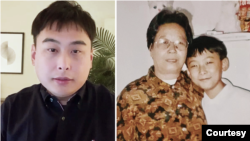Guan Yao, who lives in California, never thought that on his last video chat with his grandmother in Beijing he would watch her die.
He had installed a tiny robot camera in his grandmother's home some time ago so they could be in constant contact after he moved to the U.S. in 2016. She took to the device, holding it almost as if it provided the comfort of his touch.
Guan was video chatting with her throughout the last four hours of her life on December 22.
The 85-year-old had tested positive for COVID-19 and had had a fever for days. Two days before dying, she finally got a bed in a hospital.
Guan watched her blood oxygen saturation level suddenly turn from a low of 70 to a question mark. The doctor announced her death after an electrocardiogram.
"Her final death certificate said kidney failure because she had kidney disease before," Guan told VOA Mandarin from his home in the Los Angeles area. "Not COVID."
On the same day, the Chinese Center for Disease Control and Prevention issued an epidemic report stating that "there were no new deaths of COVID."
Before his grandmother died, Guan, 39, an IT professional, had already lost four relatives in his extended family since December 14: his father-in-law, his father, an uncle and another elderly female relative. Among them, only Guan's grandmother and uncle had tested positive for COVID-19. The others died before getting tested.
His father-in-law died of asthma. His father had heart disease and died in his sleep. His uncle's medical images showed the white lungs associated with COVID-19 when he was sent to the hospital, but his death certificate states Parkinson's disease as the cause.
China's "zero-COVID" policy reversed almost overnight after three years on December 7, when the government issued the "New Ten Measures" for epidemic prevention that announced the relaxation of coronavirus-containment controls.
A tsunami-like COVID outbreak followed, its magnitude suggested by countless tragedies reported every day on social media despite China's relentless internet censorship.
"The last day of 2022 ended with a funeral, and 2023 started with another funeral. In just half a month, the old people around here have been infected and died one after another. The sadness is lasting a bit too long," wrote a poster from Jiangsu province.
"I work in a hospital, and I see people die every day. The crematorium works 24 hours every day, but people still have to wait in line," wrote a poster from Guangdong.
Guan said, "The reopening was too sudden, prompting such a large-scale outbreak, and the medical system was completely unprepared for a large number of infection cases."
Until January 7, the official death toll from COVID-19 remained at 30.
"The statistics are definitely underreported by a lot," said Guan, a political activist who is a board member of Dialogue China, a nongovernmental think tank established by Tiananmen student leader Wang Dan. "My aunt said that she was in the emergency room and saw four or five people die and be carried away in such a short period of time."
Tan Hua, who is in Shanghai and is infected with COVID-19, told VOA Mandarin that “we don't have access to the official data now, and we don't pay attention to the data on severe disease and death, because it's completely inconsistent with how we feel around us."
When Guan's father died, the family found a one-stop service from the funeral home and spent about 30,000 yuan or roughly $4,400 to cremate him — twice the usual price. Without paying extra, they had to wait in a long queue.
When Guan's grandmother died, the hospital said the government had a collective arrangement and that all the bodies would be stored in the funeral home, waiting for collective cremation.
An official notice informed the family that the morgues in hospitals and funeral homes were full and that local warehouses had been turned into temporary morgues until the collective cremation scheduled for January 19.
For unknown reasons, Guan said his grandmother's body was not sent to the temporary morgue and was cremated on December 31.
Three years ago, when the pandemic broke out in Wuhan, Guan bought masks for his family in Beijing and told them not to believe the government. He thought they were spreading lies to cover up the pandemic. He never imagined that after three years of lockdown, China would witness death on such a scale.
"The three years [of lockdown] were meaningless," Guan said. "It's really unacceptable that so many loved ones have passed away. Whenever I think about it, I get really, really angry and sometimes I bang on the table at breakfast."
When other overseas Chinese media approached Guan, hoping to interview him about the deaths in his family, he declined.
"I worried that they [the government] were going to do something under the rug," he said. "My grandmother was such an important relative, and if she couldn't be cremated because of my [media] appearance, my family would hate me for the rest of my life."
Now that all five of his relatives have been cremated, Guan said that he doesn't mind telling his story.
"Five relatives left in eight days. It's too unusual. Someone has to tell the story," he said.
The Lunar New Year arrives on January 22 this year. Guan’s father always spent New Year's Eve with his mother, Guan's grandmother. Being so far away across the Pacific Ocean, Guan would make video calls to his grandmother on the holiday, sharing New Year’s blessings, chatting about family affairs and making jokes.
This year, he keeps thinking of his grandmother who died not knowing that her only son had died three days before her.
"There is no one left home," Guan said. "To be honest, there is nothing to celebrate this year."
Hai Bao and Adrianna Zhang contributed to this report.







